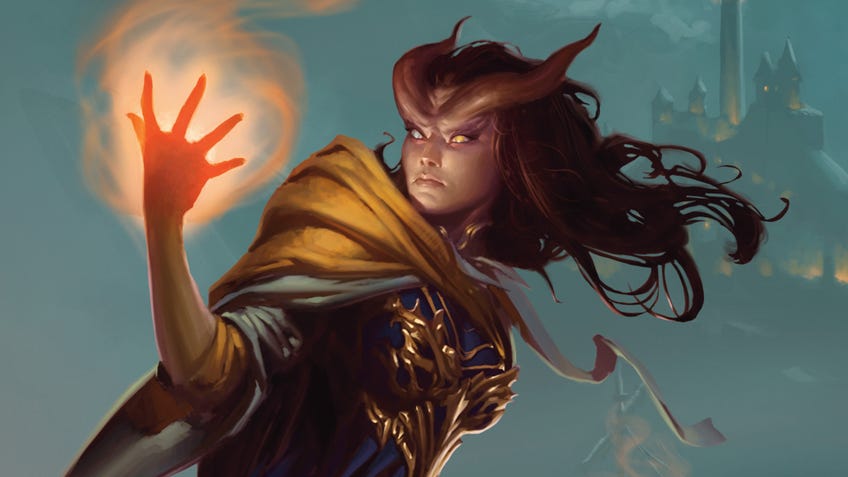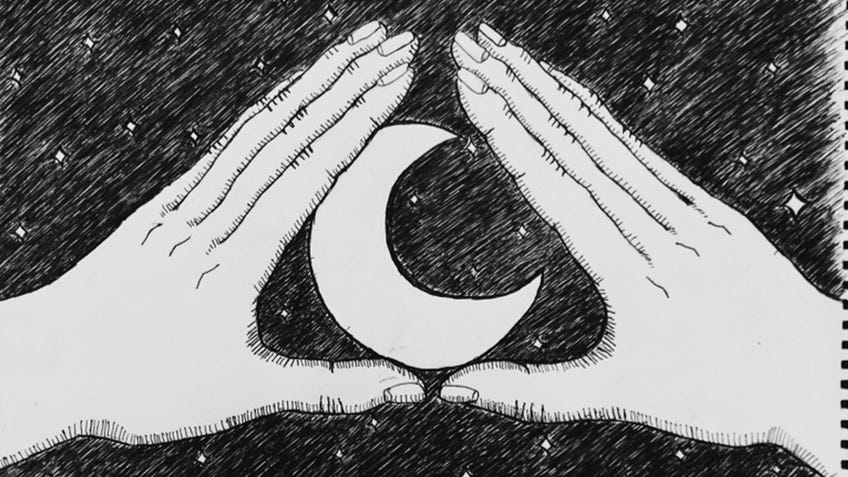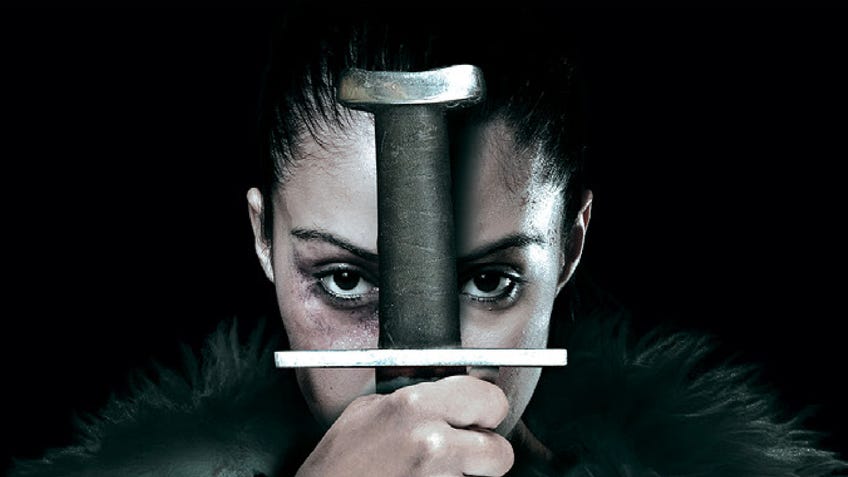How to play tabletop RPGs by yourself: A beginner's guide to solo roleplaying
What do you mean, ‘solo roleplaying’?
Think about tabletop roleplaying games, and an image of friends sitting around a table filled with character sheets, small collections of dice and snacks likely springs to mind. The hobby has been associated with group play for the entirety of its existence. But that doesn’t mean you can’t enjoy the same sense of discovery or revel in a pulpy fantasy narrative on your own.
Rules and resources for solo tabletop RPGs have become more prolific in recent years, with designers crafting their own systems and adapting fan favorites for parties of one. Perhaps you’re a GM test-driving a new module, or your regular group all cancelled and left you with a gnawing hunger for roleplay. Solo RPGs can even be approached the same way you would a single-player video game; it isn’t a lonely task to play by yourself, you can explore and enjoy the world at your own pace.
How to play tabletop RPGs by yourself
- Getting started with single-player RPGs: Roleplaying by yourself can seem strange for many at first - here are the basics.
- Popular types of solo RPG: From keeping a fictional journal to exploring distant lands, solo RPGs are as varied as their multiplayer counterparts.
- Can you play Dungeons & Dragons 5E by yourself?: How to adapt D&D 5E for a single-player experience.
- How to play other multiplayer tabletop RPGs by yourself: Not enough players for your favourite RPG? No problem!
- Where to find solo RPGs: Seek out the best single-player RPGs with this advice.
- Solo roleplaying resources and tools: Oracles, random generators and everything else you need to start solo roleplaying.
Having the knowledge and skills to play tabletop RPGs by yourself opens a host of new opportunities within the hobby, and this guide is the perfect place to start. We’ll show you where to find your perfect game, how to adapt existing systems, and some favourite tips and tools that will make the entire experience more seamless and enjoyable.
Getting started with single-player RPGs
Before we talk about the specifics, it’s important to understand that the solo RPG experience can’t be neatly transitioned from your usual group play. You won’t be able to wear the GM hat and player hat simultaneously. Many systems abstract the duties of running the game into dice rolls and random tables, allowing you the freedom to make important decisions and enjoy how they shape the ongoing story. Others shift the focus away from numbers and maths in lieu of an experience akin to a Choose Your Own Adventure book. In any case, expect some adjustment to your expectations.
You will also notice the games recommended in this guide de-emphasise the sort of crunchy, tactical combat common in Dungeons & Dragons 5E and Pathfinder. This is somewhat by necessity, as one player can only bring so many tools to each fight. The results are less battles of HP-whittling attrition and more puzzle-box approaches to encounters with unfriendly foes. Your choices carry more weight, for both good and ill.

Popular types of solo RPG
So, where do you start? Well, that can be a complicated question to answer. Like traditional tabletop RPGs, solo roleplaying games exist to suit a broad range of preferred playstyles. Instead of linking to intimidating lists of dozens of published titles, we’ve picked out some popular and noteworthy examples of solo RPG types to help guide your search for the perfect game.
Journaling: Are you the kind of player who comes to the table with six pages of backstory for your character? Do you fantasise about the small talk and relatively minor discoveries the party makes as they travel between the capital and the dragon’s lair? Journaling games speak directly to your style. Most use a deck of standard playing cards and/or a six-sided die to deliver writing prompts for you to expound upon in a journal or stack of papers. One Day at a Thyme, for example, casts you as the inhabitant of a cottage in the woods, living out your slightly magical life through dated entries. The Page I Didn’t Write, by contrast, is all about putting difficult but important thoughts to page. What makes them so must be discovered through play.
One of the more popular titles in this style, and a recommended entry point, is The Adventurer. Use your deck of cards to flesh out a world, your characters, their quest, and then set off on adventure by narrating events in your own hand. It encompasses all of the notes you might expect in a session of tabletop play, only focused on the perspective of one individual. Ostensibly simple encounters, such as meeting a wolf cub in the forest or happening across a roadside shrine, might take on personal import. It’s also an excellent routine for practising creative writing.

Open-ended experiences: Indie designer Takuma Okada released Alone Among the Stars in December of 2018, delivering a contemplative adventure through space that prioritised short descriptions, personal reflection and seeking comfort in being by oneself. It resonated with the online tabletop community and quickly spawned dozens of hacks, each adapting the emotional core to new settings. You can often, but not always, identify these ‘Alone at the Table’ games by their similar naming conventions. (Okada themself maintains a list on their Itch.io creator page.) Like journal games, players record their path in a notebook or document before moving on to the next prompt. Alone in Your Car folds this into its theme by asking players to use a voice recorder. Listening to your own voice can be jarring and uncomfortable, but also illuminating.
Unlike journal games, hacks based on Alone Among the Stars end whenever the player feels like their journey should end. It is less about reaching a destination or accomplishing a goal than experiencing the journey’s effect on your character and on yourself.

Dungeon-delving: “Okay,” you think. “Feelings are fine and all, but when do I get to swing my sword at a monster and laugh in the face of certain death?” Not to worry; solo RPGs offer plenty of experiences built around defying danger and the odds in environs both weird and wondrous. By far the most popular entry in this vein is Ironsworn, a system and setting designed first for individual play (though rules are included for guided and cooperative adventuring). The land of Ironsworn is cold, merciless and constantly dangerous, so your character must respond in kind. Character sheets and action rolls help acclimate those players intimidated by the prospect of fully narrative roleplaying.
We Forest Three combines equal parts Filipino folklore and time-bending fairy tale to deliver an encounter-based game where you seek salvation for humanity, or die trying. It doesn’t endeavour to spool out an entire world, though its excellent worldbuilding hints at things beyond the player character’s understanding. This game, and other encounter-based games like it, are best for players who enjoy rolling dice and overcoming challenges but might struggle to tell a complete story on their own.

Can you play Dungeons & Dragons 5E by yourself?
Short answer? Absolutely. The longer answer involves solving certain problems when adapting Dungeon & Dragons 5E to solo play, given that the whole system and all of its published adventures are designed around a group. Your biggest concern will be replacing the DM, whose guiding hand makes decisions for everything in the world that isn't your character - which is quite a bit. Enter the question/answer mechanic, often called the Oracle in solo RPG communities. The Oracle systematises GM duties - outcomes, NPC interactions, loot and so on - using random rolls on tables or yes/no answers to questions. These Oracle systems can be as complex or simple as you like, allowing players to decide the level of abstraction or granularity they prefer.
Can you run those published D&D adventures sitting on your bookshelf by yourself? Yes, but the efficacy of that endeavour is a point of contention among solo RPG players. Sections of Curse of Strahd, for example, become a nightmarish tangle of rolls, hand waving and referencing indices when played alone, yet members of the r/solo_roleplaying subreddit concocted a nifty workaround for playing the vampire lord himself. Ultimately, how much you enjoy playing, say, Out of the Abyss on your own is a subjective call.
If you are simply a fan of Dungeons & Dragons 5E’s d20 system and the world of the Forgotten Realms, homebrewing a campaign involves much less legwork when adventuring on your own. Think of it like improvisational D&D using familiar props, or a game of Mad Libs. Random tables featuring the locations, rulers, gods and monsters of the 5E setting can be found online, letting you stumble through into adventure with a few rolls of the dice. Does it mean you might discover a benevolent wererabbit rules Waterdeep and is waging war against aquatic dwarves? Sure, but who wouldn’t want to play that campaign?

How to play other multiplayer tabletop RPGs by yourself
Here’s the cool part about those Oracles mentioned above: many of them are system-agnostic and can be adapted to your favourite ruleset. The yes/no/maybe with modifiers setup only requires a question to be asked regardless of whether its a medieval knight, an intergalactic outlaw, a detective outrunning cosmic horrors or a modern-day superhero.
That said, designers have created specific supplements for playing popular systems by yourself, such as Blades in the Dark adaptation Alone in the Dark. If you feel like universal Oracles just don’t translate the experience, it's worth asking a dedicated community for alternatives.
Where to find solo RPGs
Perhaps your interest has been piqued, and now you’re wondering where to find these solo experiences. DriveThruRPG still boasts one of the more expansive libraries of products; most of the Oracles, systems and games mentioned up to this point can be found on the digital store. That said, several titles have their own dedicated websites with more information and links to expansions and supplements. It’s definitely worth chasing down home pages if you’re a fan of a particular designer’s work.
Indie marketplace Itch.io has become a blossoming garden for new and experimental RPGs. You can find journal games, dozens of Alone at the Table hacks, more traditional solo RPGs, and plenty of hidden gems by searching tags such as “solo rpg”, “alone”, and “single player” under the Physical Games section.
Dedicated online communities will often help you not only find the game or tool you’re looking for, but can introduce you to new experiences or interesting ways to spin old favourites. If you find that solo RPGs speak to you, seek out groups and creators on social media and on digital storefronts to share, ironically, your individual adventures.

Solo roleplaying resources and tools
Oracles:
- DM for DnD Solo Players by Bernardo Piedade
- Mythic Game Master Emulator by Word Mill (also available as a physical deck)
- The Solo Adventurer's Toolbox by 5E Solo Gamebooks
- Elminster's Guide to Solo Adventuring by Oliver Gibson
- CRGE: Conjectural Roleplaying GM Emulator by Conjecture Games
Random generators for NPC names, locations and more:
Game lists:
- Dicebreaker's own Wheels put together five top solo RPGs to get you started
- /r/Solo_Roleplaying’s list of solitaire games and systems is extensive but overwhelming for beginners

